In-depth Critical Review of a Research Philosophy with Case Study
VerifiedAdded on 2023/06/03
|18
|5066
|189
Essay
AI Summary
This essay provides a critical review of research philosophy, primarily focusing on positivism and interpretivism. It begins with an overview of positivism, tracing its origins from empiricism to its modern applications, including the concepts of verification and falsification. The essay then analyzes a chosen article, examining its philosophical underpinnings and positivist influences. A quality critique is presented, followed by an exploration of interpretivism as an alternative lens through which to analyze the research. The essay concludes by evaluating the chosen article's research philosophy, considering its ontology and epistemology, and discussing the implications of different philosophical approaches on the research's findings and conclusions. This resource is available on Desklib, where students can find a wide array of solved assignments and past papers.

Running head: RESEARCH PHILOSOPHY
Critical Review of a Research Philosophy
Name of the Student
Name of the University
Author note
Critical Review of a Research Philosophy
Name of the Student
Name of the University
Author note
Paraphrase This Document
Need a fresh take? Get an instant paraphrase of this document with our AI Paraphraser
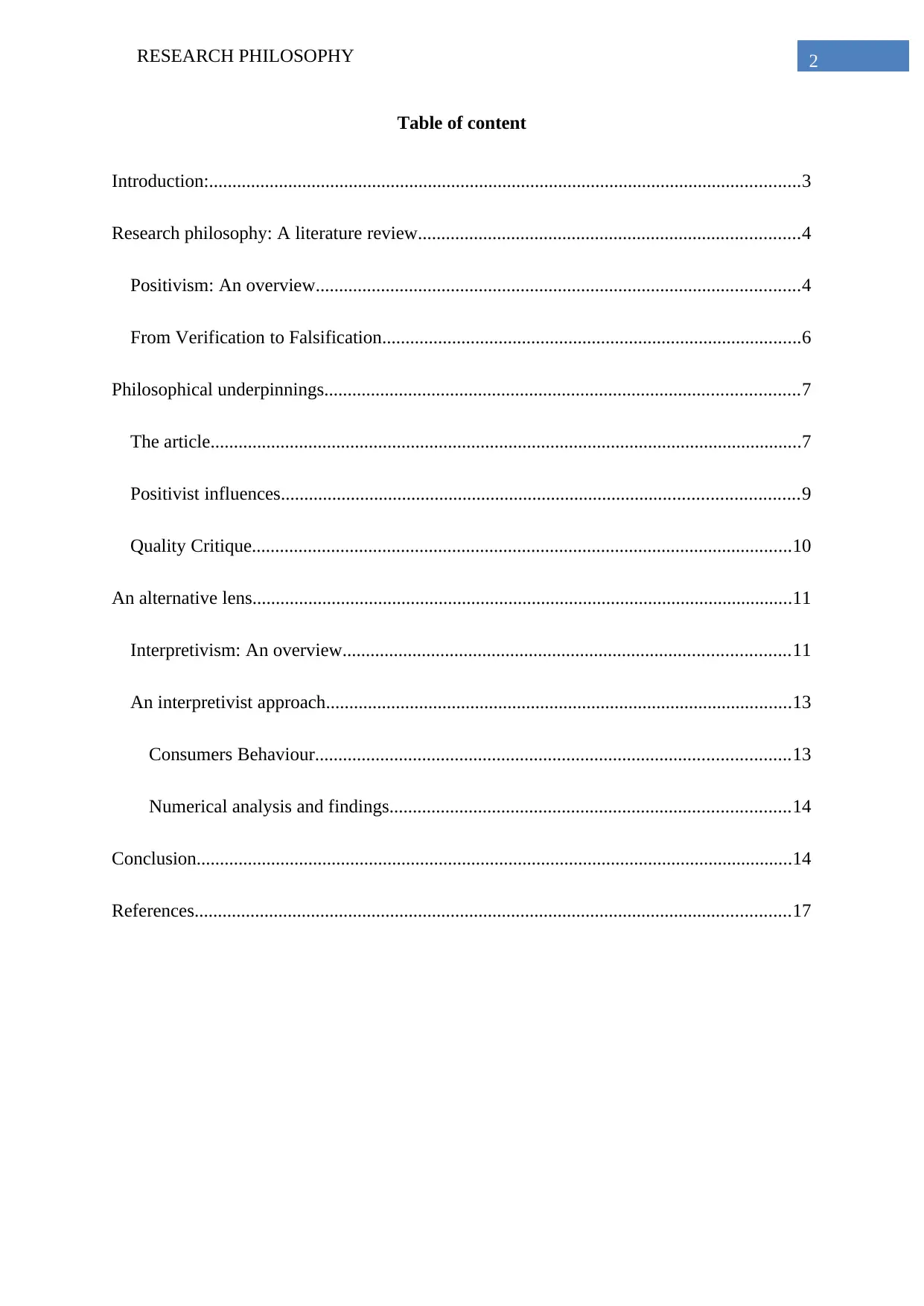
2RESEARCH PHILOSOPHY
Table of content
Introduction:...............................................................................................................................3
Research philosophy: A literature review..................................................................................4
Positivism: An overview........................................................................................................4
From Verification to Falsification..........................................................................................6
Philosophical underpinnings......................................................................................................7
The article...............................................................................................................................7
Positivist influences...............................................................................................................9
Quality Critique....................................................................................................................10
An alternative lens....................................................................................................................11
Interpretivism: An overview................................................................................................11
An interpretivist approach....................................................................................................13
Consumers Behaviour......................................................................................................13
Numerical analysis and findings......................................................................................14
Conclusion................................................................................................................................14
References................................................................................................................................17
Table of content
Introduction:...............................................................................................................................3
Research philosophy: A literature review..................................................................................4
Positivism: An overview........................................................................................................4
From Verification to Falsification..........................................................................................6
Philosophical underpinnings......................................................................................................7
The article...............................................................................................................................7
Positivist influences...............................................................................................................9
Quality Critique....................................................................................................................10
An alternative lens....................................................................................................................11
Interpretivism: An overview................................................................................................11
An interpretivist approach....................................................................................................13
Consumers Behaviour......................................................................................................13
Numerical analysis and findings......................................................................................14
Conclusion................................................................................................................................14
References................................................................................................................................17
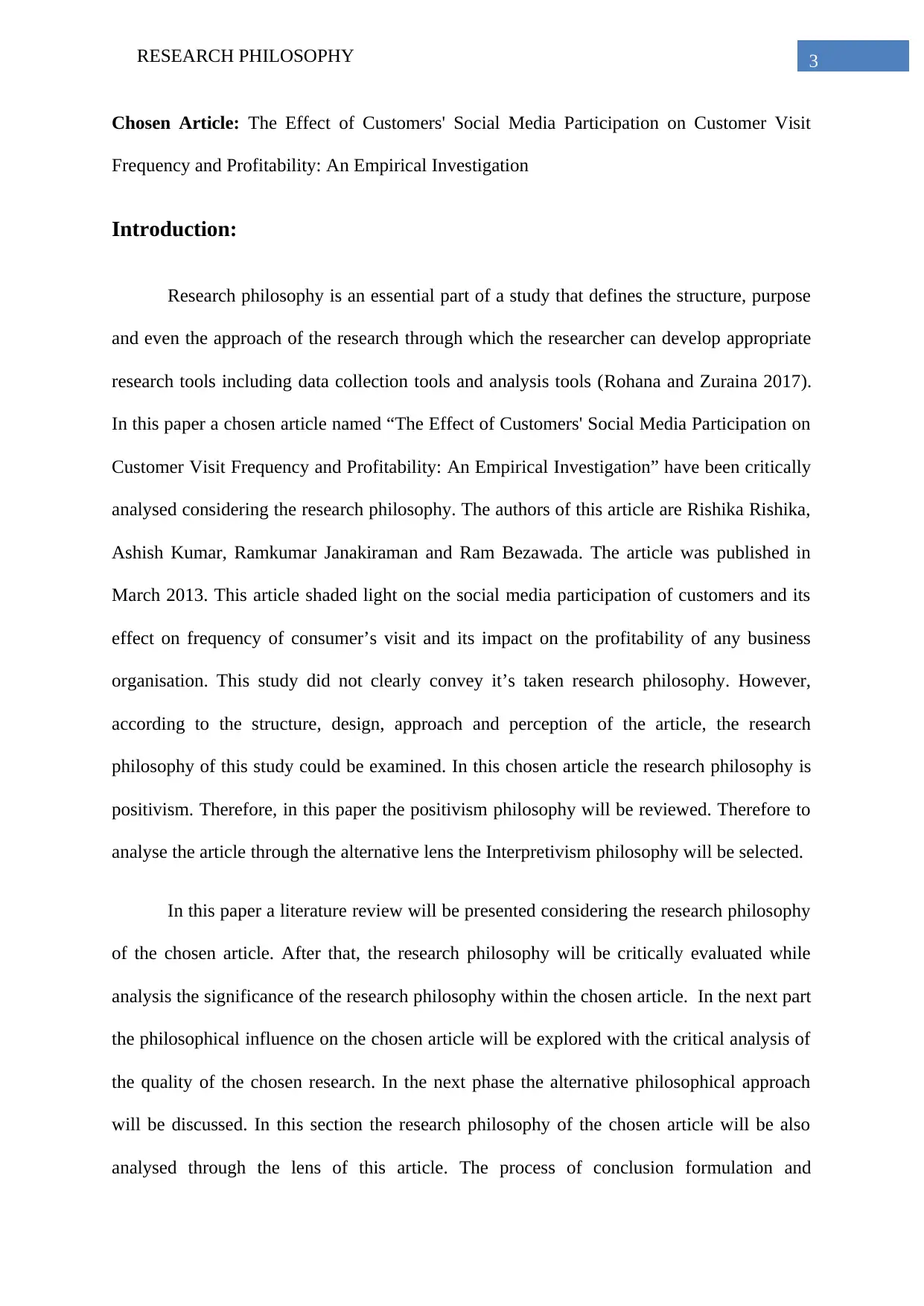
3RESEARCH PHILOSOPHY
Chosen Article: The Effect of Customers' Social Media Participation on Customer Visit
Frequency and Profitability: An Empirical Investigation
Introduction:
Research philosophy is an essential part of a study that defines the structure, purpose
and even the approach of the research through which the researcher can develop appropriate
research tools including data collection tools and analysis tools (Rohana and Zuraina 2017).
In this paper a chosen article named “The Effect of Customers' Social Media Participation on
Customer Visit Frequency and Profitability: An Empirical Investigation” have been critically
analysed considering the research philosophy. The authors of this article are Rishika Rishika,
Ashish Kumar, Ramkumar Janakiraman and Ram Bezawada. The article was published in
March 2013. This article shaded light on the social media participation of customers and its
effect on frequency of consumer’s visit and its impact on the profitability of any business
organisation. This study did not clearly convey it’s taken research philosophy. However,
according to the structure, design, approach and perception of the article, the research
philosophy of this study could be examined. In this chosen article the research philosophy is
positivism. Therefore, in this paper the positivism philosophy will be reviewed. Therefore to
analyse the article through the alternative lens the Interpretivism philosophy will be selected.
In this paper a literature review will be presented considering the research philosophy
of the chosen article. After that, the research philosophy will be critically evaluated while
analysis the significance of the research philosophy within the chosen article. In the next part
the philosophical influence on the chosen article will be explored with the critical analysis of
the quality of the chosen research. In the next phase the alternative philosophical approach
will be discussed. In this section the research philosophy of the chosen article will be also
analysed through the lens of this article. The process of conclusion formulation and
Chosen Article: The Effect of Customers' Social Media Participation on Customer Visit
Frequency and Profitability: An Empirical Investigation
Introduction:
Research philosophy is an essential part of a study that defines the structure, purpose
and even the approach of the research through which the researcher can develop appropriate
research tools including data collection tools and analysis tools (Rohana and Zuraina 2017).
In this paper a chosen article named “The Effect of Customers' Social Media Participation on
Customer Visit Frequency and Profitability: An Empirical Investigation” have been critically
analysed considering the research philosophy. The authors of this article are Rishika Rishika,
Ashish Kumar, Ramkumar Janakiraman and Ram Bezawada. The article was published in
March 2013. This article shaded light on the social media participation of customers and its
effect on frequency of consumer’s visit and its impact on the profitability of any business
organisation. This study did not clearly convey it’s taken research philosophy. However,
according to the structure, design, approach and perception of the article, the research
philosophy of this study could be examined. In this chosen article the research philosophy is
positivism. Therefore, in this paper the positivism philosophy will be reviewed. Therefore to
analyse the article through the alternative lens the Interpretivism philosophy will be selected.
In this paper a literature review will be presented considering the research philosophy
of the chosen article. After that, the research philosophy will be critically evaluated while
analysis the significance of the research philosophy within the chosen article. In the next part
the philosophical influence on the chosen article will be explored with the critical analysis of
the quality of the chosen research. In the next phase the alternative philosophical approach
will be discussed. In this section the research philosophy of the chosen article will be also
analysed through the lens of this article. The process of conclusion formulation and
⊘ This is a preview!⊘
Do you want full access?
Subscribe today to unlock all pages.

Trusted by 1+ million students worldwide
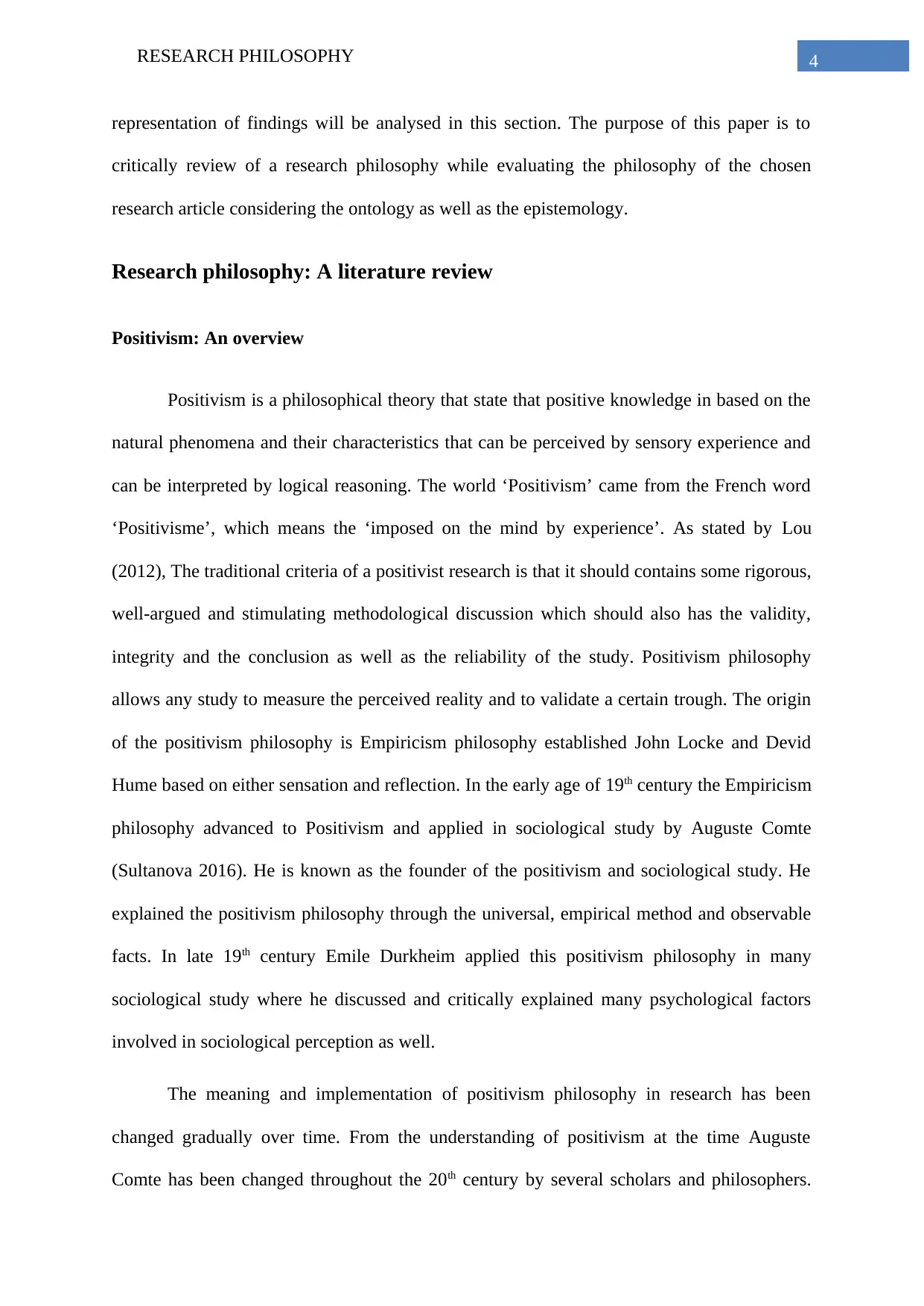
4RESEARCH PHILOSOPHY
representation of findings will be analysed in this section. The purpose of this paper is to
critically review of a research philosophy while evaluating the philosophy of the chosen
research article considering the ontology as well as the epistemology.
Research philosophy: A literature review
Positivism: An overview
Positivism is a philosophical theory that state that positive knowledge in based on the
natural phenomena and their characteristics that can be perceived by sensory experience and
can be interpreted by logical reasoning. The world ‘Positivism’ came from the French word
‘Positivisme’, which means the ‘imposed on the mind by experience’. As stated by Lou
(2012), The traditional criteria of a positivist research is that it should contains some rigorous,
well-argued and stimulating methodological discussion which should also has the validity,
integrity and the conclusion as well as the reliability of the study. Positivism philosophy
allows any study to measure the perceived reality and to validate a certain trough. The origin
of the positivism philosophy is Empiricism philosophy established John Locke and Devid
Hume based on either sensation and reflection. In the early age of 19th century the Empiricism
philosophy advanced to Positivism and applied in sociological study by Auguste Comte
(Sultanova 2016). He is known as the founder of the positivism and sociological study. He
explained the positivism philosophy through the universal, empirical method and observable
facts. In late 19th century Emile Durkheim applied this positivism philosophy in many
sociological study where he discussed and critically explained many psychological factors
involved in sociological perception as well.
The meaning and implementation of positivism philosophy in research has been
changed gradually over time. From the understanding of positivism at the time Auguste
Comte has been changed throughout the 20th century by several scholars and philosophers.
representation of findings will be analysed in this section. The purpose of this paper is to
critically review of a research philosophy while evaluating the philosophy of the chosen
research article considering the ontology as well as the epistemology.
Research philosophy: A literature review
Positivism: An overview
Positivism is a philosophical theory that state that positive knowledge in based on the
natural phenomena and their characteristics that can be perceived by sensory experience and
can be interpreted by logical reasoning. The world ‘Positivism’ came from the French word
‘Positivisme’, which means the ‘imposed on the mind by experience’. As stated by Lou
(2012), The traditional criteria of a positivist research is that it should contains some rigorous,
well-argued and stimulating methodological discussion which should also has the validity,
integrity and the conclusion as well as the reliability of the study. Positivism philosophy
allows any study to measure the perceived reality and to validate a certain trough. The origin
of the positivism philosophy is Empiricism philosophy established John Locke and Devid
Hume based on either sensation and reflection. In the early age of 19th century the Empiricism
philosophy advanced to Positivism and applied in sociological study by Auguste Comte
(Sultanova 2016). He is known as the founder of the positivism and sociological study. He
explained the positivism philosophy through the universal, empirical method and observable
facts. In late 19th century Emile Durkheim applied this positivism philosophy in many
sociological study where he discussed and critically explained many psychological factors
involved in sociological perception as well.
The meaning and implementation of positivism philosophy in research has been
changed gradually over time. From the understanding of positivism at the time Auguste
Comte has been changed throughout the 20th century by several scholars and philosophers.
Paraphrase This Document
Need a fresh take? Get an instant paraphrase of this document with our AI Paraphraser
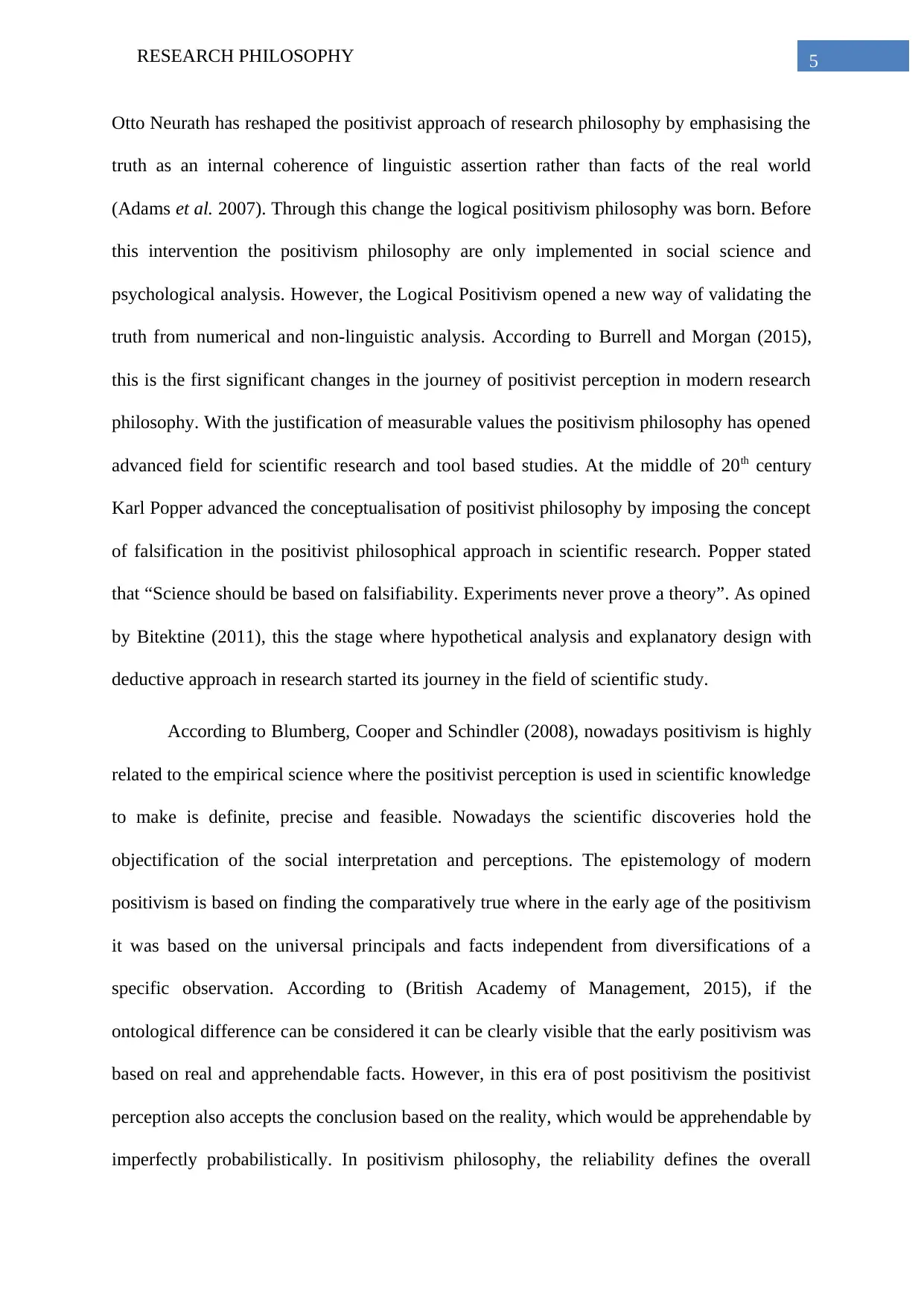
5RESEARCH PHILOSOPHY
Otto Neurath has reshaped the positivist approach of research philosophy by emphasising the
truth as an internal coherence of linguistic assertion rather than facts of the real world
(Adams et al. 2007). Through this change the logical positivism philosophy was born. Before
this intervention the positivism philosophy are only implemented in social science and
psychological analysis. However, the Logical Positivism opened a new way of validating the
truth from numerical and non-linguistic analysis. According to Burrell and Morgan (2015),
this is the first significant changes in the journey of positivist perception in modern research
philosophy. With the justification of measurable values the positivism philosophy has opened
advanced field for scientific research and tool based studies. At the middle of 20th century
Karl Popper advanced the conceptualisation of positivist philosophy by imposing the concept
of falsification in the positivist philosophical approach in scientific research. Popper stated
that “Science should be based on falsifiability. Experiments never prove a theory”. As opined
by Bitektine (2011), this the stage where hypothetical analysis and explanatory design with
deductive approach in research started its journey in the field of scientific study.
According to Blumberg, Cooper and Schindler (2008), nowadays positivism is highly
related to the empirical science where the positivist perception is used in scientific knowledge
to make is definite, precise and feasible. Nowadays the scientific discoveries hold the
objectification of the social interpretation and perceptions. The epistemology of modern
positivism is based on finding the comparatively true where in the early age of the positivism
it was based on the universal principals and facts independent from diversifications of a
specific observation. According to (British Academy of Management, 2015), if the
ontological difference can be considered it can be clearly visible that the early positivism was
based on real and apprehendable facts. However, in this era of post positivism the positivist
perception also accepts the conclusion based on the reality, which would be apprehendable by
imperfectly probabilistically. In positivism philosophy, the reliability defines the overall
Otto Neurath has reshaped the positivist approach of research philosophy by emphasising the
truth as an internal coherence of linguistic assertion rather than facts of the real world
(Adams et al. 2007). Through this change the logical positivism philosophy was born. Before
this intervention the positivism philosophy are only implemented in social science and
psychological analysis. However, the Logical Positivism opened a new way of validating the
truth from numerical and non-linguistic analysis. According to Burrell and Morgan (2015),
this is the first significant changes in the journey of positivist perception in modern research
philosophy. With the justification of measurable values the positivism philosophy has opened
advanced field for scientific research and tool based studies. At the middle of 20th century
Karl Popper advanced the conceptualisation of positivist philosophy by imposing the concept
of falsification in the positivist philosophical approach in scientific research. Popper stated
that “Science should be based on falsifiability. Experiments never prove a theory”. As opined
by Bitektine (2011), this the stage where hypothetical analysis and explanatory design with
deductive approach in research started its journey in the field of scientific study.
According to Blumberg, Cooper and Schindler (2008), nowadays positivism is highly
related to the empirical science where the positivist perception is used in scientific knowledge
to make is definite, precise and feasible. Nowadays the scientific discoveries hold the
objectification of the social interpretation and perceptions. The epistemology of modern
positivism is based on finding the comparatively true where in the early age of the positivism
it was based on the universal principals and facts independent from diversifications of a
specific observation. According to (British Academy of Management, 2015), if the
ontological difference can be considered it can be clearly visible that the early positivism was
based on real and apprehendable facts. However, in this era of post positivism the positivist
perception also accepts the conclusion based on the reality, which would be apprehendable by
imperfectly probabilistically. In positivism philosophy, the reliability defines the overall
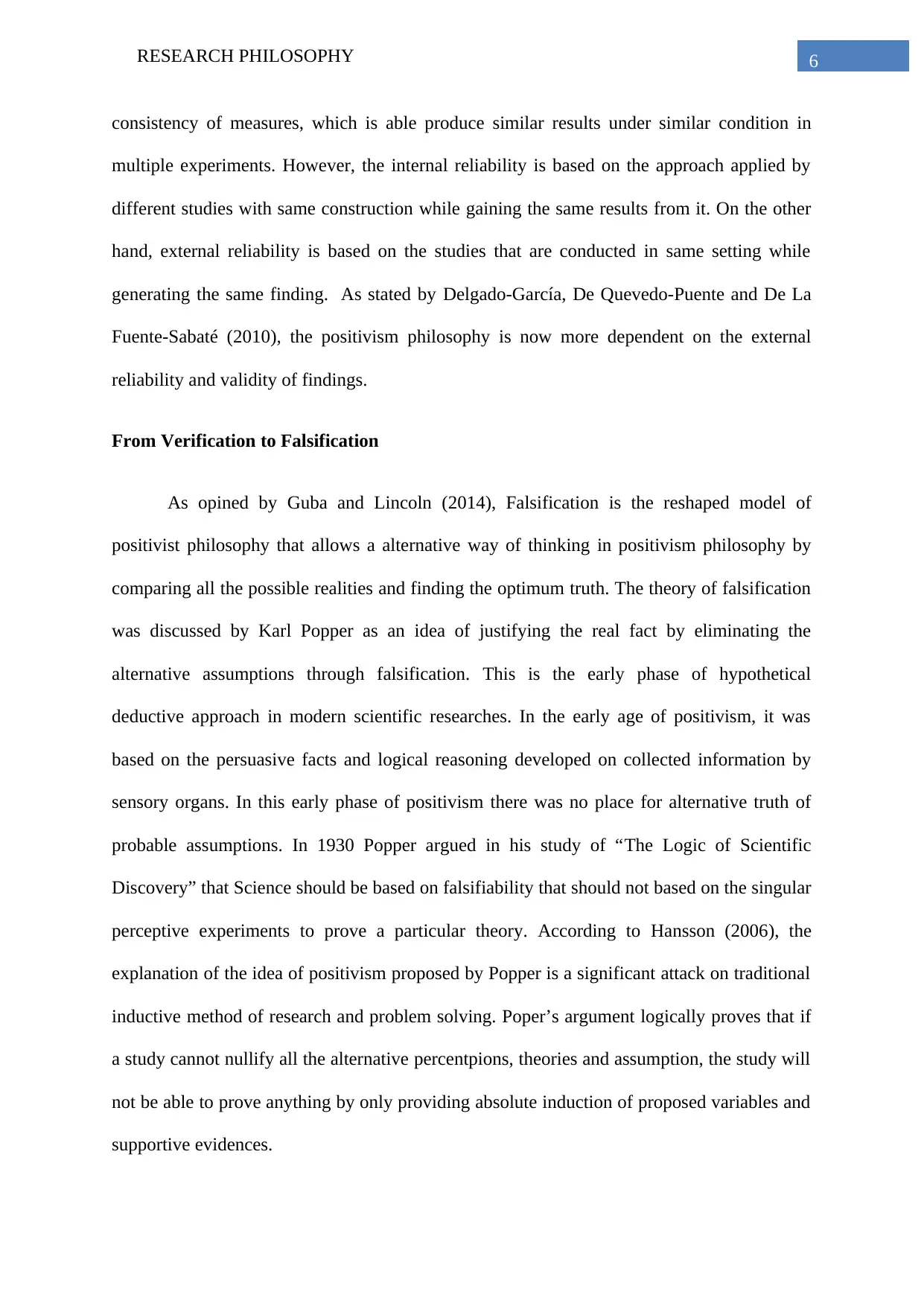
6RESEARCH PHILOSOPHY
consistency of measures, which is able produce similar results under similar condition in
multiple experiments. However, the internal reliability is based on the approach applied by
different studies with same construction while gaining the same results from it. On the other
hand, external reliability is based on the studies that are conducted in same setting while
generating the same finding. As stated by Delgado-García, De Quevedo-Puente and De La
Fuente-Sabaté (2010), the positivism philosophy is now more dependent on the external
reliability and validity of findings.
From Verification to Falsification
As opined by Guba and Lincoln (2014), Falsification is the reshaped model of
positivist philosophy that allows a alternative way of thinking in positivism philosophy by
comparing all the possible realities and finding the optimum truth. The theory of falsification
was discussed by Karl Popper as an idea of justifying the real fact by eliminating the
alternative assumptions through falsification. This is the early phase of hypothetical
deductive approach in modern scientific researches. In the early age of positivism, it was
based on the persuasive facts and logical reasoning developed on collected information by
sensory organs. In this early phase of positivism there was no place for alternative truth of
probable assumptions. In 1930 Popper argued in his study of “The Logic of Scientific
Discovery” that Science should be based on falsifiability that should not based on the singular
perceptive experiments to prove a particular theory. According to Hansson (2006), the
explanation of the idea of positivism proposed by Popper is a significant attack on traditional
inductive method of research and problem solving. Poper’s argument logically proves that if
a study cannot nullify all the alternative percentpions, theories and assumption, the study will
not be able to prove anything by only providing absolute induction of proposed variables and
supportive evidences.
consistency of measures, which is able produce similar results under similar condition in
multiple experiments. However, the internal reliability is based on the approach applied by
different studies with same construction while gaining the same results from it. On the other
hand, external reliability is based on the studies that are conducted in same setting while
generating the same finding. As stated by Delgado-García, De Quevedo-Puente and De La
Fuente-Sabaté (2010), the positivism philosophy is now more dependent on the external
reliability and validity of findings.
From Verification to Falsification
As opined by Guba and Lincoln (2014), Falsification is the reshaped model of
positivist philosophy that allows a alternative way of thinking in positivism philosophy by
comparing all the possible realities and finding the optimum truth. The theory of falsification
was discussed by Karl Popper as an idea of justifying the real fact by eliminating the
alternative assumptions through falsification. This is the early phase of hypothetical
deductive approach in modern scientific researches. In the early age of positivism, it was
based on the persuasive facts and logical reasoning developed on collected information by
sensory organs. In this early phase of positivism there was no place for alternative truth of
probable assumptions. In 1930 Popper argued in his study of “The Logic of Scientific
Discovery” that Science should be based on falsifiability that should not based on the singular
perceptive experiments to prove a particular theory. According to Hansson (2006), the
explanation of the idea of positivism proposed by Popper is a significant attack on traditional
inductive method of research and problem solving. Poper’s argument logically proves that if
a study cannot nullify all the alternative percentpions, theories and assumption, the study will
not be able to prove anything by only providing absolute induction of proposed variables and
supportive evidences.
⊘ This is a preview!⊘
Do you want full access?
Subscribe today to unlock all pages.

Trusted by 1+ million students worldwide
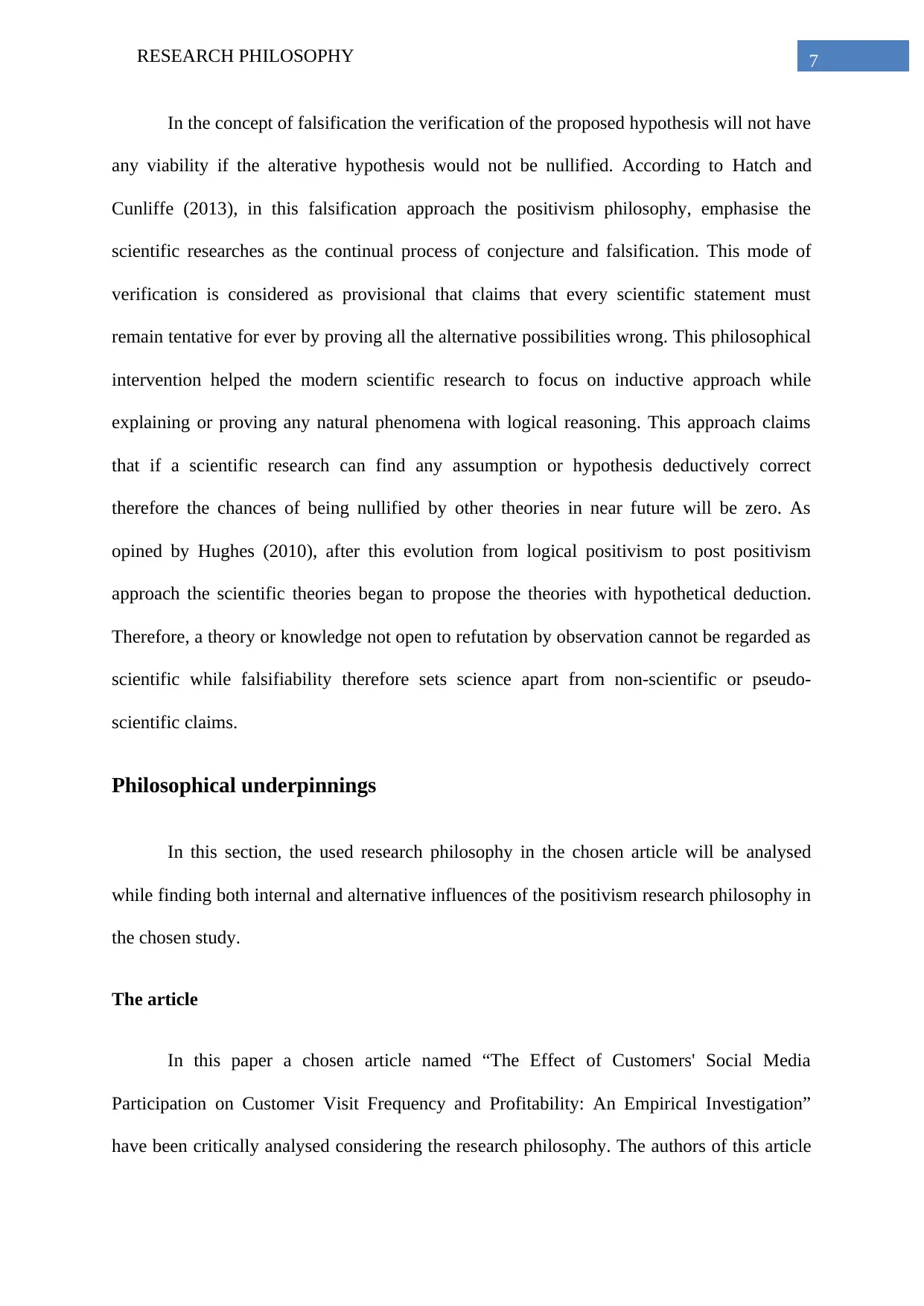
7RESEARCH PHILOSOPHY
In the concept of falsification the verification of the proposed hypothesis will not have
any viability if the alterative hypothesis would not be nullified. According to Hatch and
Cunliffe (2013), in this falsification approach the positivism philosophy, emphasise the
scientific researches as the continual process of conjecture and falsification. This mode of
verification is considered as provisional that claims that every scientific statement must
remain tentative for ever by proving all the alternative possibilities wrong. This philosophical
intervention helped the modern scientific research to focus on inductive approach while
explaining or proving any natural phenomena with logical reasoning. This approach claims
that if a scientific research can find any assumption or hypothesis deductively correct
therefore the chances of being nullified by other theories in near future will be zero. As
opined by Hughes (2010), after this evolution from logical positivism to post positivism
approach the scientific theories began to propose the theories with hypothetical deduction.
Therefore, a theory or knowledge not open to refutation by observation cannot be regarded as
scientific while falsifiability therefore sets science apart from non-scientific or pseudo-
scientific claims.
Philosophical underpinnings
In this section, the used research philosophy in the chosen article will be analysed
while finding both internal and alternative influences of the positivism research philosophy in
the chosen study.
The article
In this paper a chosen article named “The Effect of Customers' Social Media
Participation on Customer Visit Frequency and Profitability: An Empirical Investigation”
have been critically analysed considering the research philosophy. The authors of this article
In the concept of falsification the verification of the proposed hypothesis will not have
any viability if the alterative hypothesis would not be nullified. According to Hatch and
Cunliffe (2013), in this falsification approach the positivism philosophy, emphasise the
scientific researches as the continual process of conjecture and falsification. This mode of
verification is considered as provisional that claims that every scientific statement must
remain tentative for ever by proving all the alternative possibilities wrong. This philosophical
intervention helped the modern scientific research to focus on inductive approach while
explaining or proving any natural phenomena with logical reasoning. This approach claims
that if a scientific research can find any assumption or hypothesis deductively correct
therefore the chances of being nullified by other theories in near future will be zero. As
opined by Hughes (2010), after this evolution from logical positivism to post positivism
approach the scientific theories began to propose the theories with hypothetical deduction.
Therefore, a theory or knowledge not open to refutation by observation cannot be regarded as
scientific while falsifiability therefore sets science apart from non-scientific or pseudo-
scientific claims.
Philosophical underpinnings
In this section, the used research philosophy in the chosen article will be analysed
while finding both internal and alternative influences of the positivism research philosophy in
the chosen study.
The article
In this paper a chosen article named “The Effect of Customers' Social Media
Participation on Customer Visit Frequency and Profitability: An Empirical Investigation”
have been critically analysed considering the research philosophy. The authors of this article
Paraphrase This Document
Need a fresh take? Get an instant paraphrase of this document with our AI Paraphraser
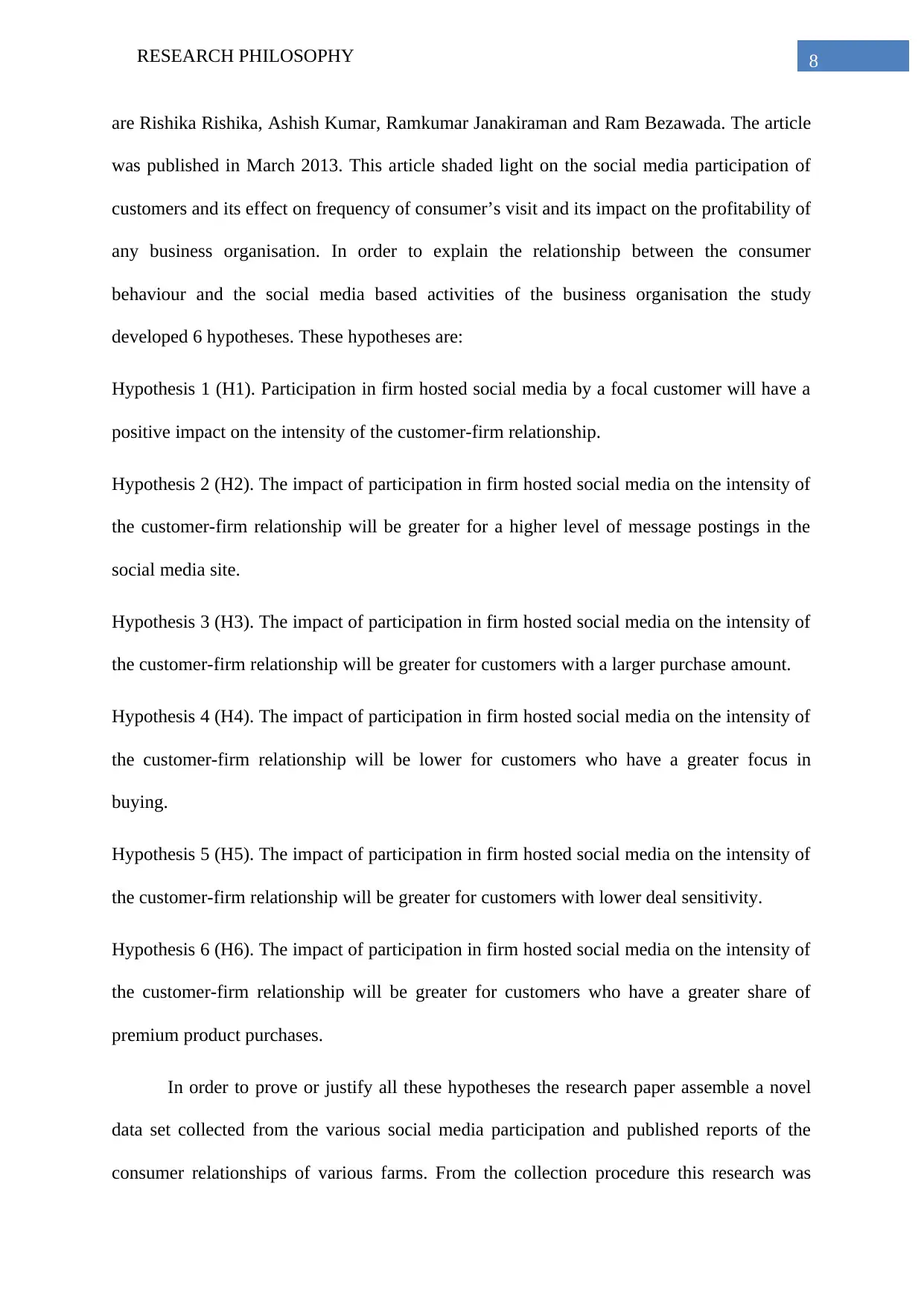
8RESEARCH PHILOSOPHY
are Rishika Rishika, Ashish Kumar, Ramkumar Janakiraman and Ram Bezawada. The article
was published in March 2013. This article shaded light on the social media participation of
customers and its effect on frequency of consumer’s visit and its impact on the profitability of
any business organisation. In order to explain the relationship between the consumer
behaviour and the social media based activities of the business organisation the study
developed 6 hypotheses. These hypotheses are:
Hypothesis 1 (H1). Participation in firm hosted social media by a focal customer will have a
positive impact on the intensity of the customer-firm relationship.
Hypothesis 2 (H2). The impact of participation in firm hosted social media on the intensity of
the customer-firm relationship will be greater for a higher level of message postings in the
social media site.
Hypothesis 3 (H3). The impact of participation in firm hosted social media on the intensity of
the customer-firm relationship will be greater for customers with a larger purchase amount.
Hypothesis 4 (H4). The impact of participation in firm hosted social media on the intensity of
the customer-firm relationship will be lower for customers who have a greater focus in
buying.
Hypothesis 5 (H5). The impact of participation in firm hosted social media on the intensity of
the customer-firm relationship will be greater for customers with lower deal sensitivity.
Hypothesis 6 (H6). The impact of participation in firm hosted social media on the intensity of
the customer-firm relationship will be greater for customers who have a greater share of
premium product purchases.
In order to prove or justify all these hypotheses the research paper assemble a novel
data set collected from the various social media participation and published reports of the
consumer relationships of various farms. From the collection procedure this research was
are Rishika Rishika, Ashish Kumar, Ramkumar Janakiraman and Ram Bezawada. The article
was published in March 2013. This article shaded light on the social media participation of
customers and its effect on frequency of consumer’s visit and its impact on the profitability of
any business organisation. In order to explain the relationship between the consumer
behaviour and the social media based activities of the business organisation the study
developed 6 hypotheses. These hypotheses are:
Hypothesis 1 (H1). Participation in firm hosted social media by a focal customer will have a
positive impact on the intensity of the customer-firm relationship.
Hypothesis 2 (H2). The impact of participation in firm hosted social media on the intensity of
the customer-firm relationship will be greater for a higher level of message postings in the
social media site.
Hypothesis 3 (H3). The impact of participation in firm hosted social media on the intensity of
the customer-firm relationship will be greater for customers with a larger purchase amount.
Hypothesis 4 (H4). The impact of participation in firm hosted social media on the intensity of
the customer-firm relationship will be lower for customers who have a greater focus in
buying.
Hypothesis 5 (H5). The impact of participation in firm hosted social media on the intensity of
the customer-firm relationship will be greater for customers with lower deal sensitivity.
Hypothesis 6 (H6). The impact of participation in firm hosted social media on the intensity of
the customer-firm relationship will be greater for customers who have a greater share of
premium product purchases.
In order to prove or justify all these hypotheses the research paper assemble a novel
data set collected from the various social media participation and published reports of the
consumer relationships of various farms. From the collection procedure this research was
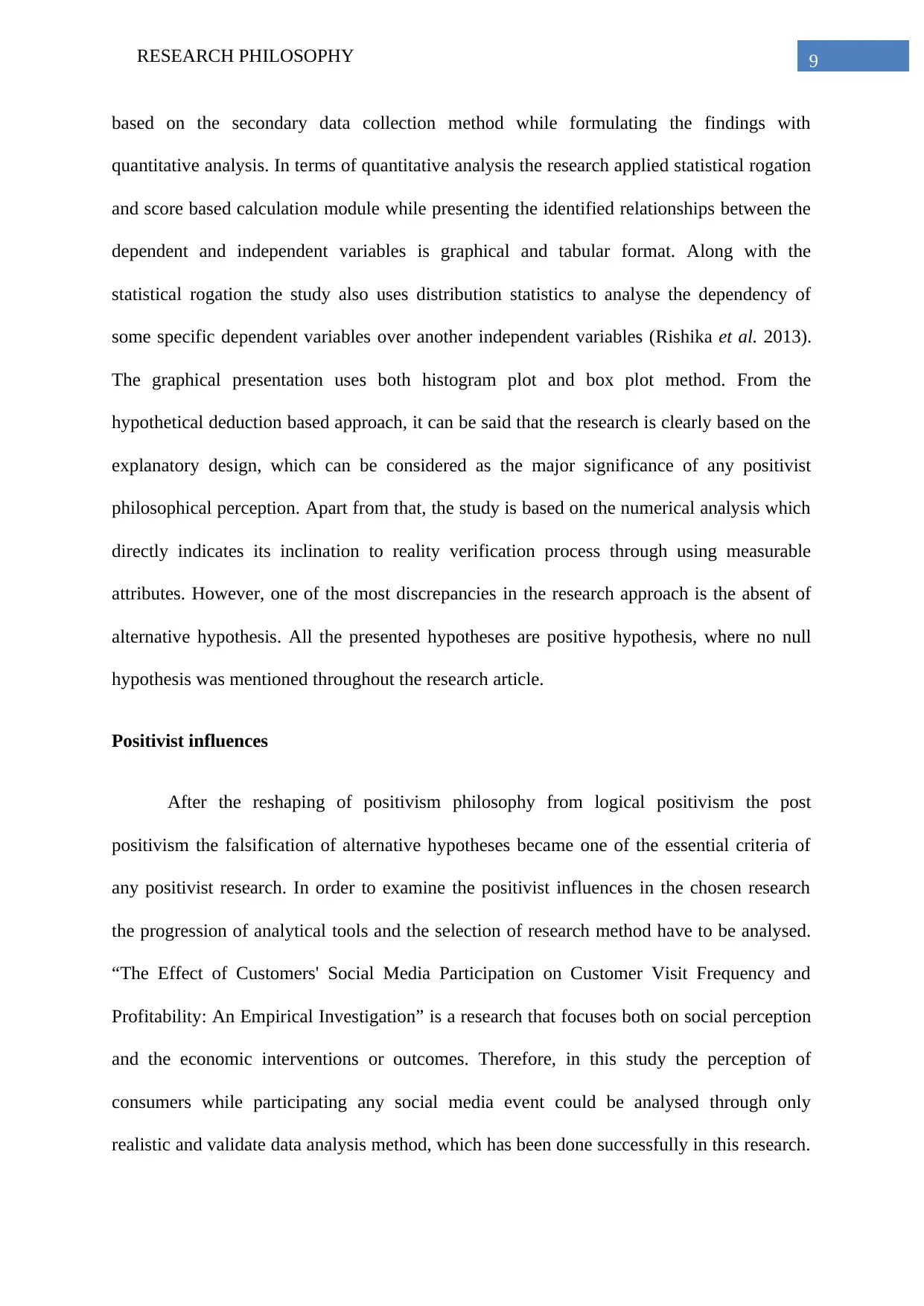
9RESEARCH PHILOSOPHY
based on the secondary data collection method while formulating the findings with
quantitative analysis. In terms of quantitative analysis the research applied statistical rogation
and score based calculation module while presenting the identified relationships between the
dependent and independent variables is graphical and tabular format. Along with the
statistical rogation the study also uses distribution statistics to analyse the dependency of
some specific dependent variables over another independent variables (Rishika et al. 2013).
The graphical presentation uses both histogram plot and box plot method. From the
hypothetical deduction based approach, it can be said that the research is clearly based on the
explanatory design, which can be considered as the major significance of any positivist
philosophical perception. Apart from that, the study is based on the numerical analysis which
directly indicates its inclination to reality verification process through using measurable
attributes. However, one of the most discrepancies in the research approach is the absent of
alternative hypothesis. All the presented hypotheses are positive hypothesis, where no null
hypothesis was mentioned throughout the research article.
Positivist influences
After the reshaping of positivism philosophy from logical positivism the post
positivism the falsification of alternative hypotheses became one of the essential criteria of
any positivist research. In order to examine the positivist influences in the chosen research
the progression of analytical tools and the selection of research method have to be analysed.
“The Effect of Customers' Social Media Participation on Customer Visit Frequency and
Profitability: An Empirical Investigation” is a research that focuses both on social perception
and the economic interventions or outcomes. Therefore, in this study the perception of
consumers while participating any social media event could be analysed through only
realistic and validate data analysis method, which has been done successfully in this research.
based on the secondary data collection method while formulating the findings with
quantitative analysis. In terms of quantitative analysis the research applied statistical rogation
and score based calculation module while presenting the identified relationships between the
dependent and independent variables is graphical and tabular format. Along with the
statistical rogation the study also uses distribution statistics to analyse the dependency of
some specific dependent variables over another independent variables (Rishika et al. 2013).
The graphical presentation uses both histogram plot and box plot method. From the
hypothetical deduction based approach, it can be said that the research is clearly based on the
explanatory design, which can be considered as the major significance of any positivist
philosophical perception. Apart from that, the study is based on the numerical analysis which
directly indicates its inclination to reality verification process through using measurable
attributes. However, one of the most discrepancies in the research approach is the absent of
alternative hypothesis. All the presented hypotheses are positive hypothesis, where no null
hypothesis was mentioned throughout the research article.
Positivist influences
After the reshaping of positivism philosophy from logical positivism the post
positivism the falsification of alternative hypotheses became one of the essential criteria of
any positivist research. In order to examine the positivist influences in the chosen research
the progression of analytical tools and the selection of research method have to be analysed.
“The Effect of Customers' Social Media Participation on Customer Visit Frequency and
Profitability: An Empirical Investigation” is a research that focuses both on social perception
and the economic interventions or outcomes. Therefore, in this study the perception of
consumers while participating any social media event could be analysed through only
realistic and validate data analysis method, which has been done successfully in this research.
⊘ This is a preview!⊘
Do you want full access?
Subscribe today to unlock all pages.

Trusted by 1+ million students worldwide
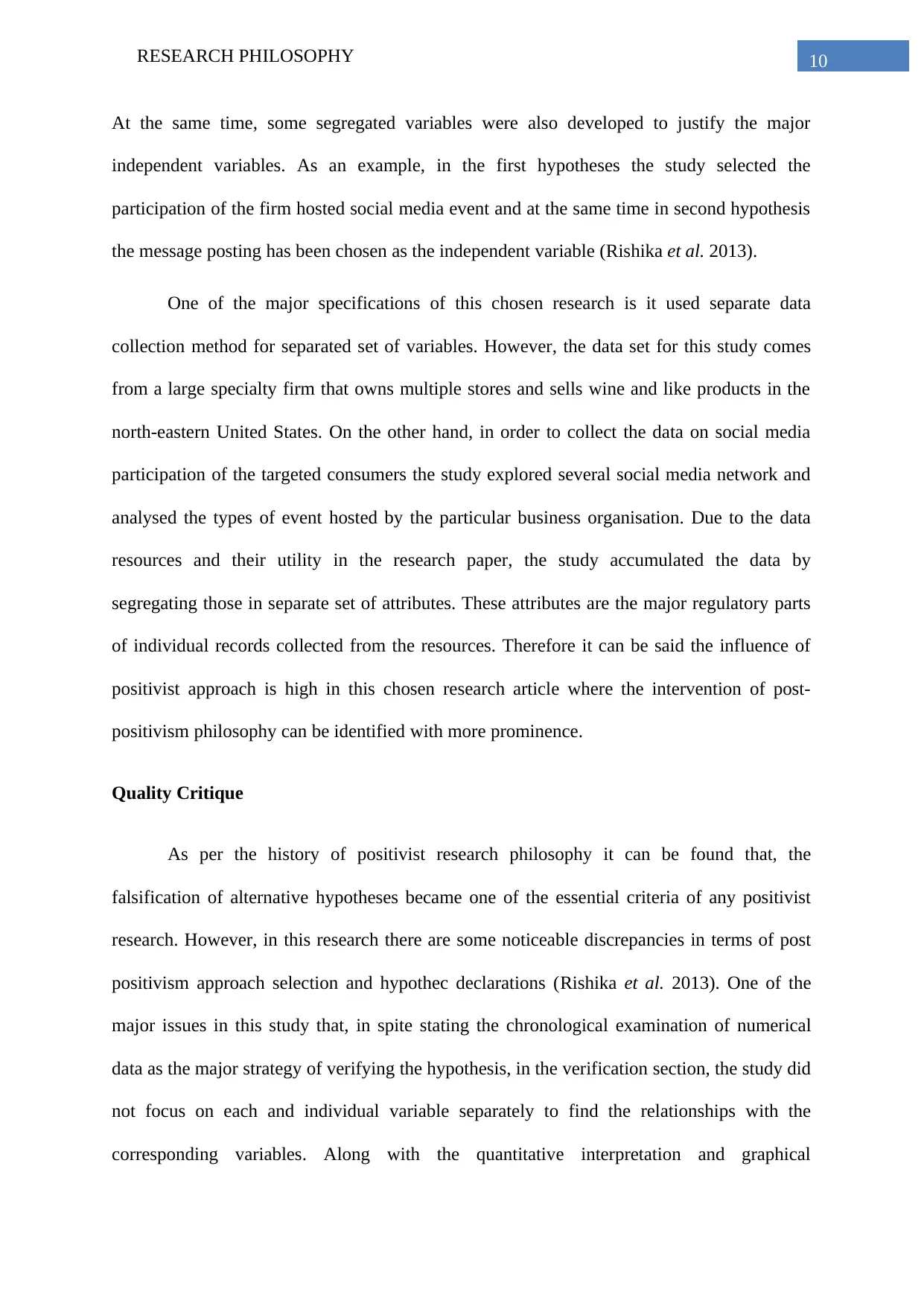
10RESEARCH PHILOSOPHY
At the same time, some segregated variables were also developed to justify the major
independent variables. As an example, in the first hypotheses the study selected the
participation of the firm hosted social media event and at the same time in second hypothesis
the message posting has been chosen as the independent variable (Rishika et al. 2013).
One of the major specifications of this chosen research is it used separate data
collection method for separated set of variables. However, the data set for this study comes
from a large specialty firm that owns multiple stores and sells wine and like products in the
north-eastern United States. On the other hand, in order to collect the data on social media
participation of the targeted consumers the study explored several social media network and
analysed the types of event hosted by the particular business organisation. Due to the data
resources and their utility in the research paper, the study accumulated the data by
segregating those in separate set of attributes. These attributes are the major regulatory parts
of individual records collected from the resources. Therefore it can be said the influence of
positivist approach is high in this chosen research article where the intervention of post-
positivism philosophy can be identified with more prominence.
Quality Critique
As per the history of positivist research philosophy it can be found that, the
falsification of alternative hypotheses became one of the essential criteria of any positivist
research. However, in this research there are some noticeable discrepancies in terms of post
positivism approach selection and hypothec declarations (Rishika et al. 2013). One of the
major issues in this study that, in spite stating the chronological examination of numerical
data as the major strategy of verifying the hypothesis, in the verification section, the study did
not focus on each and individual variable separately to find the relationships with the
corresponding variables. Along with the quantitative interpretation and graphical
At the same time, some segregated variables were also developed to justify the major
independent variables. As an example, in the first hypotheses the study selected the
participation of the firm hosted social media event and at the same time in second hypothesis
the message posting has been chosen as the independent variable (Rishika et al. 2013).
One of the major specifications of this chosen research is it used separate data
collection method for separated set of variables. However, the data set for this study comes
from a large specialty firm that owns multiple stores and sells wine and like products in the
north-eastern United States. On the other hand, in order to collect the data on social media
participation of the targeted consumers the study explored several social media network and
analysed the types of event hosted by the particular business organisation. Due to the data
resources and their utility in the research paper, the study accumulated the data by
segregating those in separate set of attributes. These attributes are the major regulatory parts
of individual records collected from the resources. Therefore it can be said the influence of
positivist approach is high in this chosen research article where the intervention of post-
positivism philosophy can be identified with more prominence.
Quality Critique
As per the history of positivist research philosophy it can be found that, the
falsification of alternative hypotheses became one of the essential criteria of any positivist
research. However, in this research there are some noticeable discrepancies in terms of post
positivism approach selection and hypothec declarations (Rishika et al. 2013). One of the
major issues in this study that, in spite stating the chronological examination of numerical
data as the major strategy of verifying the hypothesis, in the verification section, the study did
not focus on each and individual variable separately to find the relationships with the
corresponding variables. Along with the quantitative interpretation and graphical
Paraphrase This Document
Need a fresh take? Get an instant paraphrase of this document with our AI Paraphraser
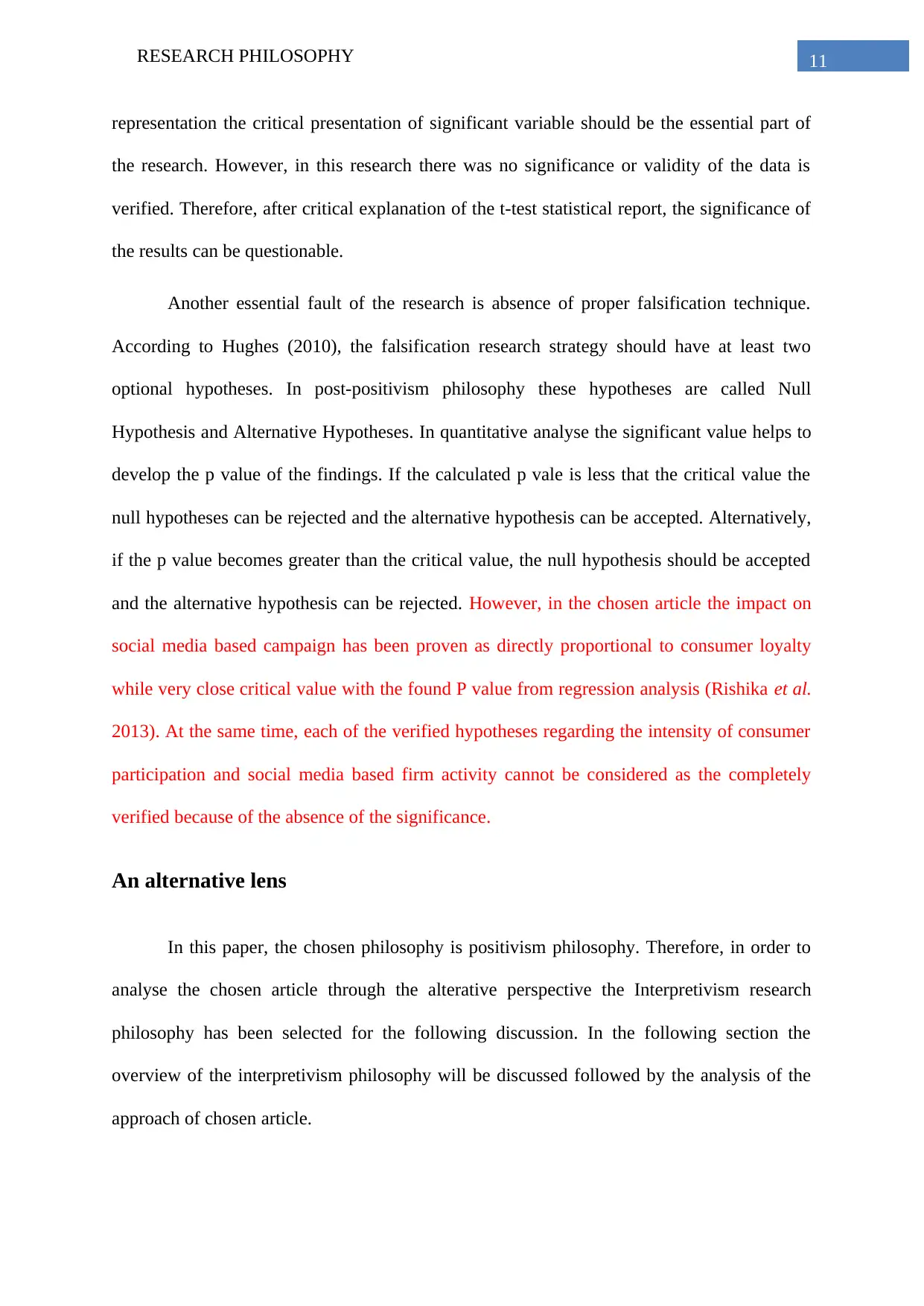
11RESEARCH PHILOSOPHY
representation the critical presentation of significant variable should be the essential part of
the research. However, in this research there was no significance or validity of the data is
verified. Therefore, after critical explanation of the t-test statistical report, the significance of
the results can be questionable.
Another essential fault of the research is absence of proper falsification technique.
According to Hughes (2010), the falsification research strategy should have at least two
optional hypotheses. In post-positivism philosophy these hypotheses are called Null
Hypothesis and Alternative Hypotheses. In quantitative analyse the significant value helps to
develop the p value of the findings. If the calculated p vale is less that the critical value the
null hypotheses can be rejected and the alternative hypothesis can be accepted. Alternatively,
if the p value becomes greater than the critical value, the null hypothesis should be accepted
and the alternative hypothesis can be rejected. However, in the chosen article the impact on
social media based campaign has been proven as directly proportional to consumer loyalty
while very close critical value with the found P value from regression analysis (Rishika et al.
2013). At the same time, each of the verified hypotheses regarding the intensity of consumer
participation and social media based firm activity cannot be considered as the completely
verified because of the absence of the significance.
An alternative lens
In this paper, the chosen philosophy is positivism philosophy. Therefore, in order to
analyse the chosen article through the alterative perspective the Interpretivism research
philosophy has been selected for the following discussion. In the following section the
overview of the interpretivism philosophy will be discussed followed by the analysis of the
approach of chosen article.
representation the critical presentation of significant variable should be the essential part of
the research. However, in this research there was no significance or validity of the data is
verified. Therefore, after critical explanation of the t-test statistical report, the significance of
the results can be questionable.
Another essential fault of the research is absence of proper falsification technique.
According to Hughes (2010), the falsification research strategy should have at least two
optional hypotheses. In post-positivism philosophy these hypotheses are called Null
Hypothesis and Alternative Hypotheses. In quantitative analyse the significant value helps to
develop the p value of the findings. If the calculated p vale is less that the critical value the
null hypotheses can be rejected and the alternative hypothesis can be accepted. Alternatively,
if the p value becomes greater than the critical value, the null hypothesis should be accepted
and the alternative hypothesis can be rejected. However, in the chosen article the impact on
social media based campaign has been proven as directly proportional to consumer loyalty
while very close critical value with the found P value from regression analysis (Rishika et al.
2013). At the same time, each of the verified hypotheses regarding the intensity of consumer
participation and social media based firm activity cannot be considered as the completely
verified because of the absence of the significance.
An alternative lens
In this paper, the chosen philosophy is positivism philosophy. Therefore, in order to
analyse the chosen article through the alterative perspective the Interpretivism research
philosophy has been selected for the following discussion. In the following section the
overview of the interpretivism philosophy will be discussed followed by the analysis of the
approach of chosen article.
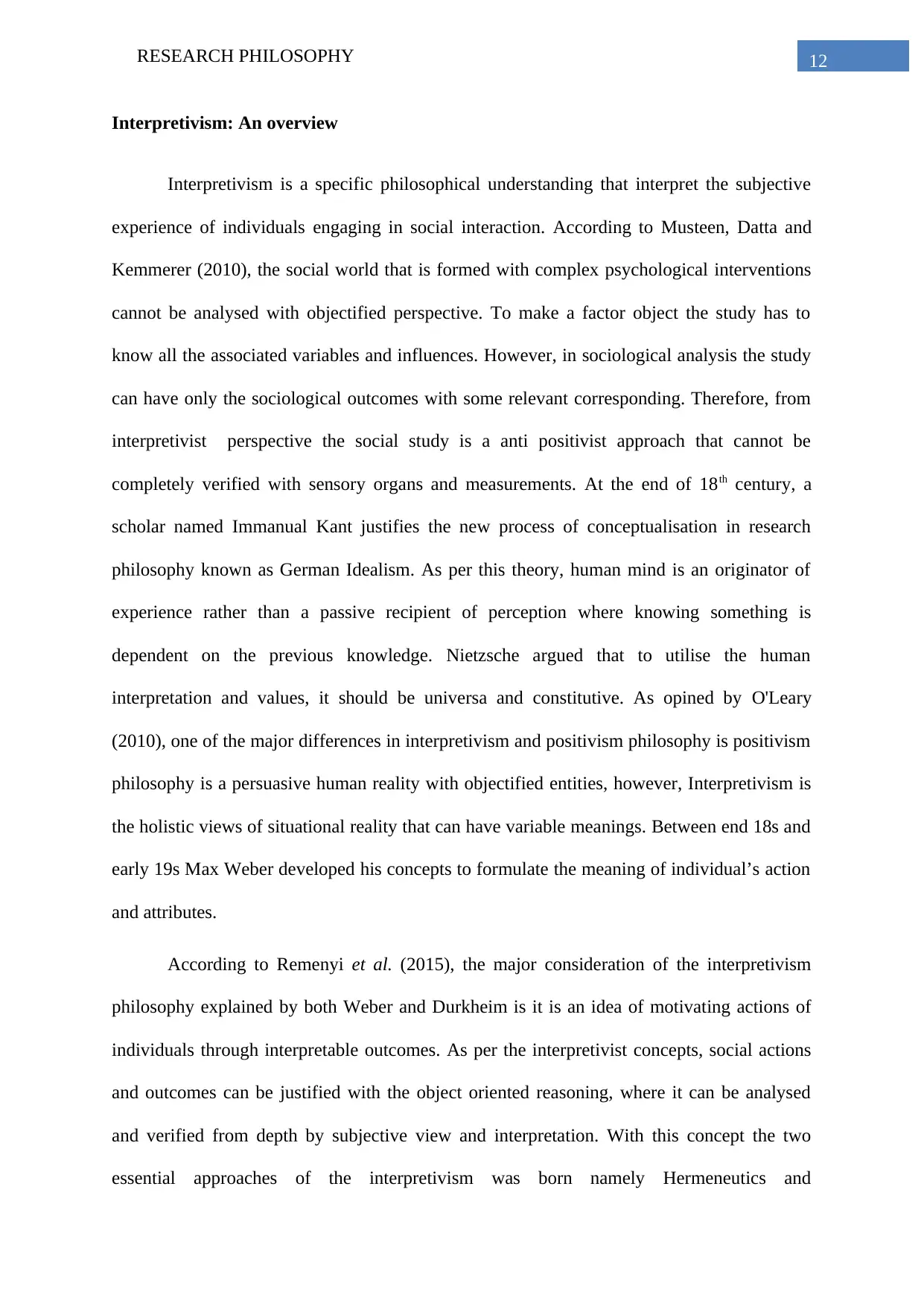
12RESEARCH PHILOSOPHY
Interpretivism: An overview
Interpretivism is a specific philosophical understanding that interpret the subjective
experience of individuals engaging in social interaction. According to Musteen, Datta and
Kemmerer (2010), the social world that is formed with complex psychological interventions
cannot be analysed with objectified perspective. To make a factor object the study has to
know all the associated variables and influences. However, in sociological analysis the study
can have only the sociological outcomes with some relevant corresponding. Therefore, from
interpretivist perspective the social study is a anti positivist approach that cannot be
completely verified with sensory organs and measurements. At the end of 18th century, a
scholar named Immanual Kant justifies the new process of conceptualisation in research
philosophy known as German Idealism. As per this theory, human mind is an originator of
experience rather than a passive recipient of perception where knowing something is
dependent on the previous knowledge. Nietzsche argued that to utilise the human
interpretation and values, it should be universa and constitutive. As opined by O'Leary
(2010), one of the major differences in interpretivism and positivism philosophy is positivism
philosophy is a persuasive human reality with objectified entities, however, Interpretivism is
the holistic views of situational reality that can have variable meanings. Between end 18s and
early 19s Max Weber developed his concepts to formulate the meaning of individual’s action
and attributes.
According to Remenyi et al. (2015), the major consideration of the interpretivism
philosophy explained by both Weber and Durkheim is it is an idea of motivating actions of
individuals through interpretable outcomes. As per the interpretivist concepts, social actions
and outcomes can be justified with the object oriented reasoning, where it can be analysed
and verified from depth by subjective view and interpretation. With this concept the two
essential approaches of the interpretivism was born namely Hermeneutics and
Interpretivism: An overview
Interpretivism is a specific philosophical understanding that interpret the subjective
experience of individuals engaging in social interaction. According to Musteen, Datta and
Kemmerer (2010), the social world that is formed with complex psychological interventions
cannot be analysed with objectified perspective. To make a factor object the study has to
know all the associated variables and influences. However, in sociological analysis the study
can have only the sociological outcomes with some relevant corresponding. Therefore, from
interpretivist perspective the social study is a anti positivist approach that cannot be
completely verified with sensory organs and measurements. At the end of 18th century, a
scholar named Immanual Kant justifies the new process of conceptualisation in research
philosophy known as German Idealism. As per this theory, human mind is an originator of
experience rather than a passive recipient of perception where knowing something is
dependent on the previous knowledge. Nietzsche argued that to utilise the human
interpretation and values, it should be universa and constitutive. As opined by O'Leary
(2010), one of the major differences in interpretivism and positivism philosophy is positivism
philosophy is a persuasive human reality with objectified entities, however, Interpretivism is
the holistic views of situational reality that can have variable meanings. Between end 18s and
early 19s Max Weber developed his concepts to formulate the meaning of individual’s action
and attributes.
According to Remenyi et al. (2015), the major consideration of the interpretivism
philosophy explained by both Weber and Durkheim is it is an idea of motivating actions of
individuals through interpretable outcomes. As per the interpretivist concepts, social actions
and outcomes can be justified with the object oriented reasoning, where it can be analysed
and verified from depth by subjective view and interpretation. With this concept the two
essential approaches of the interpretivism was born namely Hermeneutics and
⊘ This is a preview!⊘
Do you want full access?
Subscribe today to unlock all pages.

Trusted by 1+ million students worldwide
1 out of 18
Related Documents
Your All-in-One AI-Powered Toolkit for Academic Success.
+13062052269
info@desklib.com
Available 24*7 on WhatsApp / Email
![[object Object]](/_next/static/media/star-bottom.7253800d.svg)
Unlock your academic potential
Copyright © 2020–2026 A2Z Services. All Rights Reserved. Developed and managed by ZUCOL.





